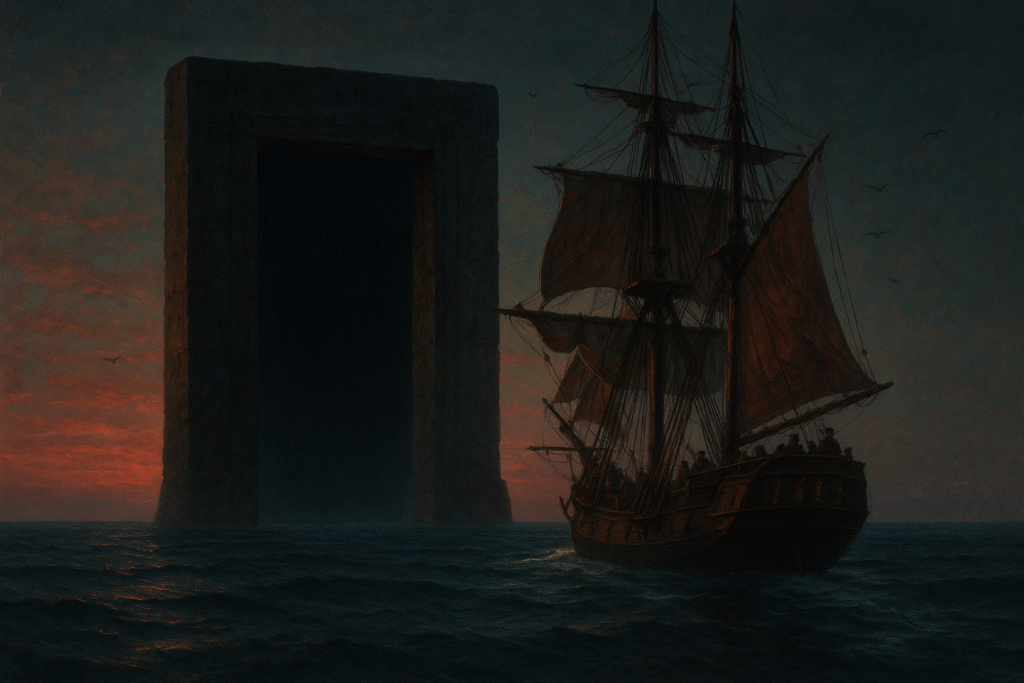The reef rose like a ledger left out in the rain—pages warped, entries still legible. The abbey lay low to the water, slate roofs torn to teeth. In its court stood a meridian arch: two stones and a lintel, inside which the sun poured a bar of gold as narrow as a promise.

“Keep us off the ink,” Mireya said. “Those pools aren’t water.”
“They’re hours,” Finn said, lifting the Oculus. Through the lens, the pools showed faces and sails and weather stacked behind themselves—moments the abbey had weighed and kept.
Silas had the longboat lowered. “We go polite,” he said. “Abbeys prefer manners to courage.”
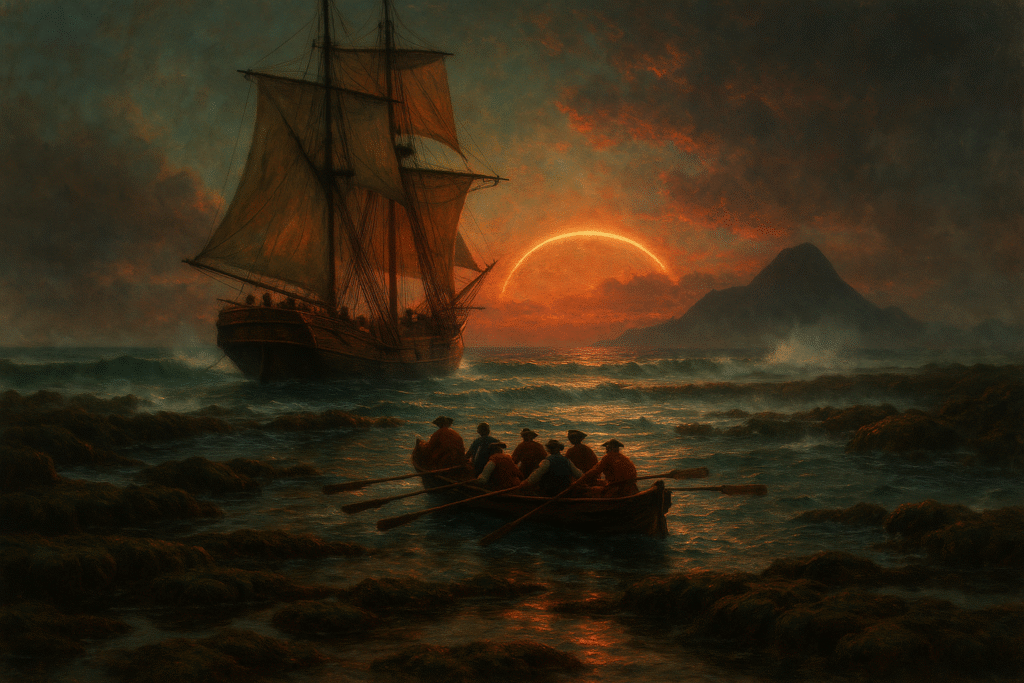
The cloister’s floor was a map laid in shell and jet. At its heart ran a meridian line inlaid with brass, pocked by old impacts, polished by bare feet that hadn’t walked in a hundred years. Where the sun fell through the arch, the line shone.
A bell tolled once—no sound, only the feeling of exact noon passing through your bones like a measure stick.
“Pay at the hour,” Mireya murmured. “Or be added to the floor.”
A script cut around the line. Finn read it with the part of his head that listened for reefs: Name your noon. Bind it. Pass clean. His palm pricked; new lines crawled in and settled into a narrow knot-glyph: constrictor—the binding you tie when slipping is not allowed.
Briggs cocked his head. “Who takes the toll?”
A shadow at the edge of the arch raised a hand: the Prior, perhaps, or what the abbey kept to play the part. Robe like wet paper. Face like a suggestion. When it spoke, the air chewed the words down to meaning:
“A silence,” it said. “From the mouth that gives your noon its orders.”
Silas let out a breath that should have been a laugh and wasn’t. “A bell?”
“A bell,” the shadow agreed.
Mireya glanced at the crew. “We can spare his voice,” she said—the arithmetic of it, not unkind. “We can’t spare his judgment.” She set her hand on the wheel of herself. “I’ll take command.”
Silas unbuckled his pride and set it aside like a sword. “Done,” he said, and the abbey collected the word and sealed his mouth with a thread of light that hummed when he tried to test it.
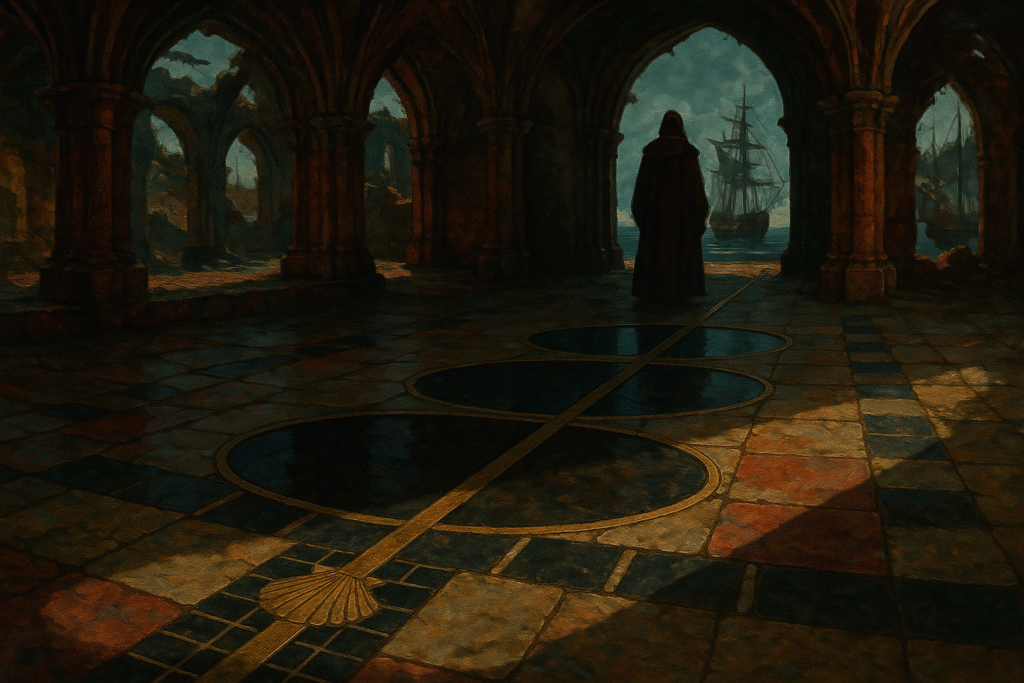
Mireya nodded once, crisp. “We bind noon,” she said. “Finn?”
He put his palm to the brass line. Heat moved up his arm—clean, not kind. The sunbar inside the arch wavered, seeking. He could feel true noon nearby, skidding like a plate on wet oak, bullied by the sea’s crooked habits and the Santa Lucía’s mirror.
“Needs holding.” He looked at Briggs. “Give me weight.”
The bosun rolled his shoulders like a man about to carry a friend. Finn looped a line around the arch’s base and tied the constrictor—turn, tuck, cross, cinch. The knot bit. The sunbar steadied a hair.
The Santa Lucía’s launch nosed into the court as if invited by the sea itself. Valdés stood in the bow, cloak quiet. In her hands, the cracked Ash Mirror waited like a verdict.
“Abbess,” she said to the shadow, Spanish vowels folded into the word. “Two ships claim your noon. Who pays better?”
The shadow watched without eyes.
“Hands,” Mireya said to Hayes, and the helmsman moved the way you do when trusting hurts and you do it anyway.
Valdés angled the mirror. Light pinched—a small subtraction—just enough to make the sunbar slip.
Finn tightened the knot until his palm burned. The constrictor held.
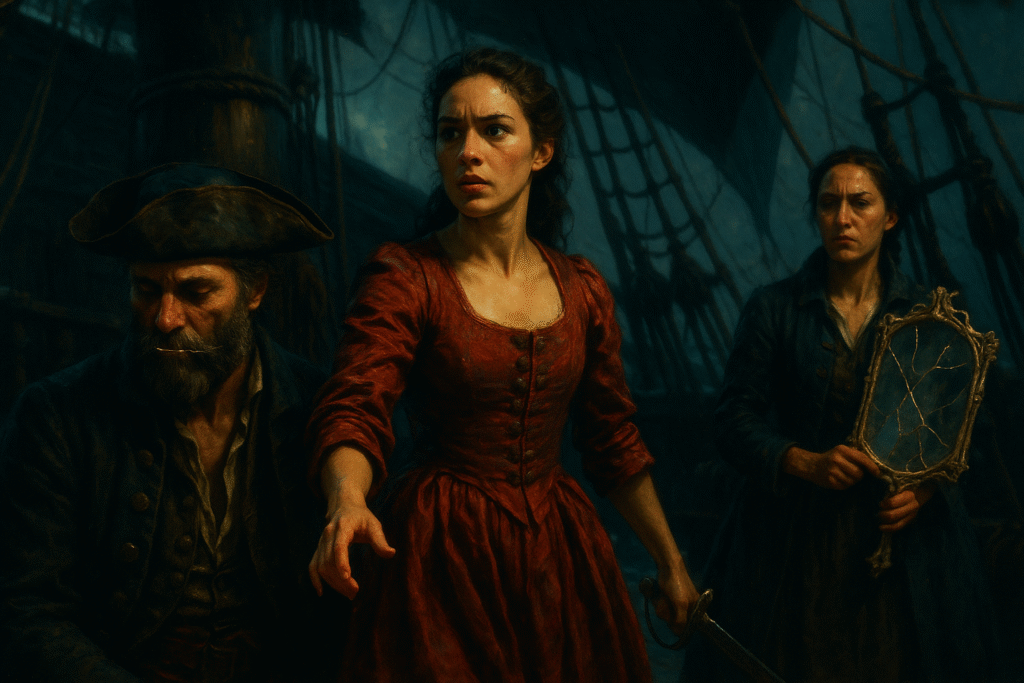
“Bind it at two points,” Mireya said. “Double it or we’ll chase it all day.”
Finn tied a second constrictor on the far side, anchoring noon between them like canvas stretched to set. The bar steadied; the meridian line hummed; the script brightened: Name your noon. Bind it. Pass clean.
Silas touched the line with two fingers, eyes flint-soft. He couldn’t speak. Mireya named it: “Noon by the ship that sings its reckonings. Noon by what we’ve paid.”
The line accepted the name. A slab beside the arch shifted; steps spiraled down into chill.
Valdés moved as if to follow, mirror high.
“Only one chain at a time,” the shadow said—no voice, all law. “Wait your bell.”
Valdés’s smile found the smallest part of her mouth. “I have patience,” she said. “I will spend theirs.”
They went below: Mireya first, then Finn with the Oculus, then Briggs, Silas last with his silence like a heavy cup.
The Meridian Vault was a cylinder hung with pendulums and lines of light. At its center stood a gnomon of black brass, finned like a fish and sharp enough to cut an hour into finer pieces. The star-compass in Finn’s hands began to purr like a cat that had found an old friend.
“Set it,” Mireya said. “But mind the mirror’s reach. It can pinch a shadow as quick as wind.”
Finn offered the Oculus to the gnomon. The lens drank light and returned truth: shadows straightened, pendulums fell in with one another, and on the floor a new line appeared—a Prime finer than the brass above.
Briggs’s breath came out reverent without asking him.
Above, something scraped: the mirror kissing stone; time considering cheating.
A pendulum stuttered. The line dimmed.
Silas stepped to the gnomon. He didn’t speak. He unsheathed his knife and scarred his palm across an old thread where the serpent lock had tasted him. Blood fell, small and accurate. The gnomon drank it and brightened.
Valdés pinched again. The vault answered with indifference.
“Take the Prime,” Mireya said. “And then go.”
A thin blade of brass slid from the gnomon’s spine—a ruler no longer than Finn’s hand, etched with nothing at all. He lifted it and felt his palm-lines re-ink themselves more exactly. The star-compass mercury settled into a calm that could not be bullied.
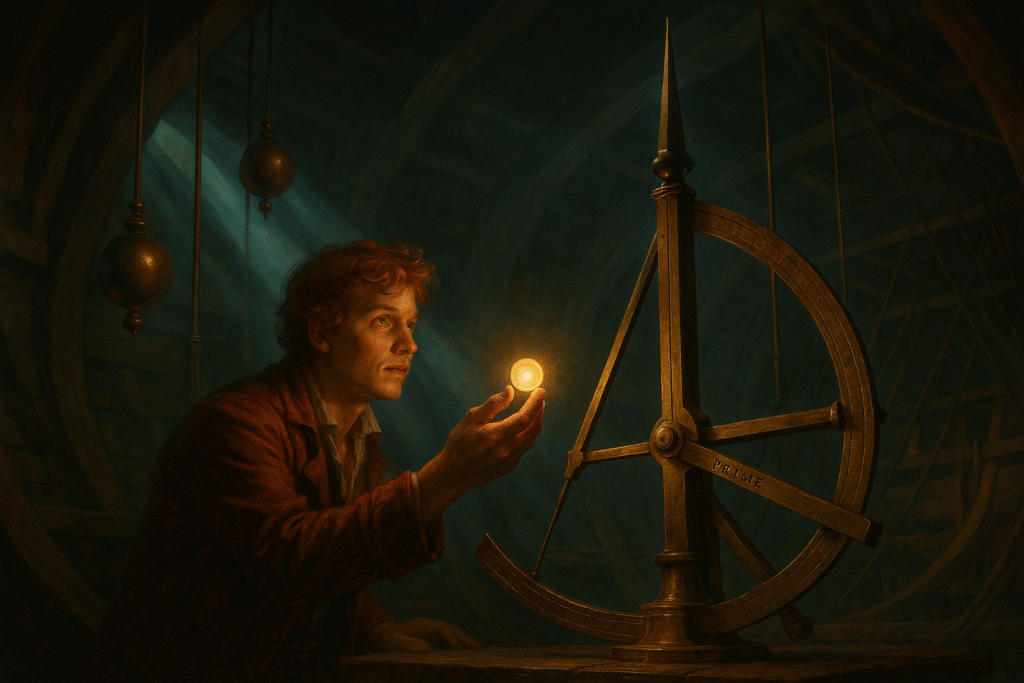
They climbed. The court was full of wind that hadn’t been there—Valdés had spent a little patience and bought a small storm. The pools of kept hours rippled; in their skins, other ships tried their noons and failed.
Mireya pointed the way out with the kind of confidence that survives being wrong. “Boat.”
Valdés let them pass, which was a choice. “Next bell,” she said. “I’ll buy the floor and the ceiling.”
Mireya didn’t answer. Silas couldn’t. Briggs did: “We’ll sell you our wake at a price you won’t like.”
The longboat skipped the reef where hours lay to catch ankles. The brig’s sweeps bit honest water. The thread of light across Silas’s mouth fluttered, thinned, lifted—his voice came back with the slightest rasp, like a violin finding bow again.
“Report,” he said.
“Prime in hand,” Mireya answered. “Compass trued. Abbey unpaid but not angry.”
“Course?”
Finn held the brass rule Prime over the star-compass; mercury answered by becoming still and sure. The sea offered a line it had been hiding because no one had asked cleanly.
“Gnomon Gate,” he said before fear could propose a different word. “A standing shadow where the world remembers why it moves.”
Silas nodded once. “Make it so.”
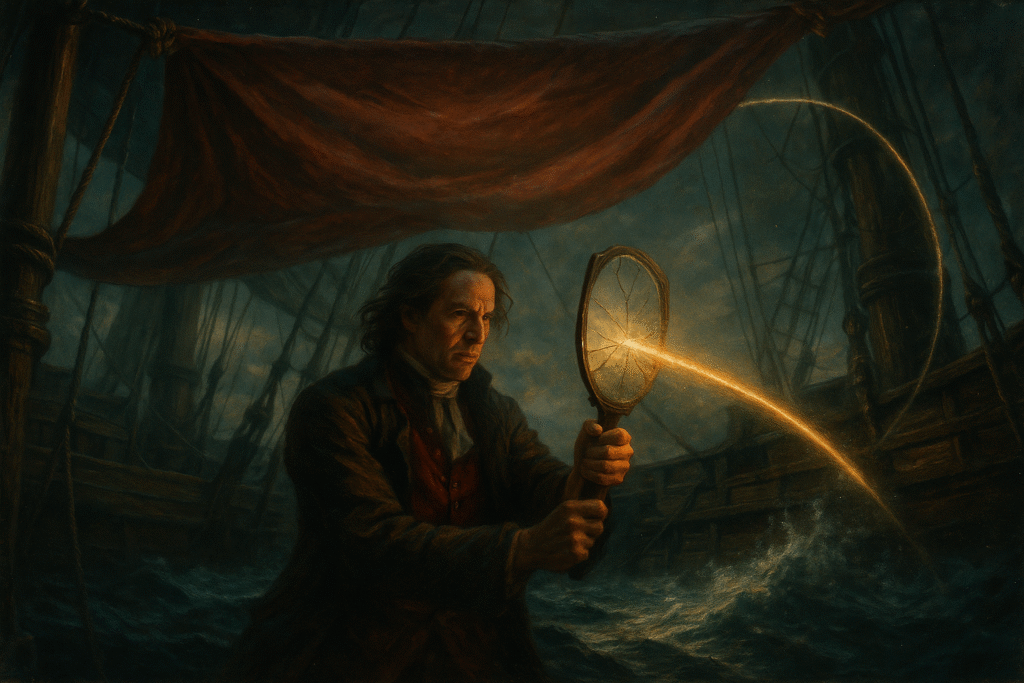
The Santa Lucía fell in astern, formal as church. Valdés watched with a face you could cut rope on. The abbey’s shadow lifted its hand, and the sun stepped off the arch like a king finished with an audience.
By dusk the reef was a line of ink behind them. The Prime lay in its slot on the star-compass like a tooth the world had been missing. The ship moved without second-guessing herself.
Briggs thumped the rail once—gratitude, not language. Mireya wrote three figures in her palm and nodded at what they added up to. Silas stood with his voice a shade dearer and his promise intact.
Finn leaned at the quarter and lifted the Oculus to the stars. Constellations resolved into instruments; their voices ran down the brass rule and spoke arithmetic he could have loved or feared. He chose love.
On the horizon, a standing shadow cut the last of the light—a stone frame taller than a storm, its void already full of night.
“Gnomon Gate,” Finn said.
The sea agreed.
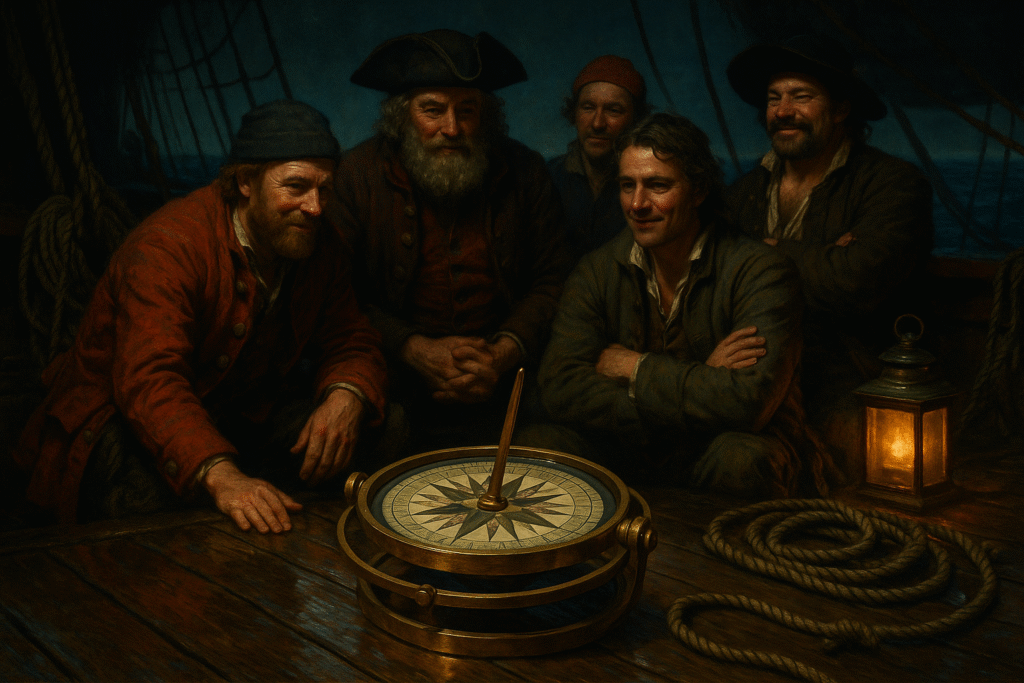
—To be continued—
